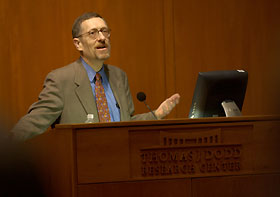For more archives, go to the Advance Archive/Search Page.
Expect More Negative Campaigning,
Says Presidential Politics Expert
Howard Reiter has never had a problem making bold statements about politics, whether in opinion pieces in local and national newspapers or during radio and television interviews. But faced with the question of who would win this year's presidential race between Sen. John Kerry and incumbent George W. Bush, Reiter is reticent.
"If you ask pundits who's going to win, most of them are cowards and say it's going to be close," said Reiter, an expert on American politics and the presidency and head of the political science department. "Well, I'm going to be even more cowardly, and say I don't even know if it's going to be close. I don't think it will be a landslide, but it could be a safe victory for one or the other. I wouldn't put money on either of those guys at this point."
 |
|
Howard Reiter, professor and head of the political
science department, speaks about presidential politics at Konover Auditorium
April 15. Photo by Peter Morenus
|
Reiter made his comments during a lecture April 15 in Konover Auditorium. The event was sponsored by the Connecticut Academy of Arts and Sciences. During a wide-ranging talk, Reiter touched on changes in the nominating process, the campaign, campaign finance reform - briefly - and negative campaigning.
He said Americans are about to see more negative campaigning - but for a surprising reason.
"In the 19th century, there was a strong negative tone to many elections, mostly because people all had a strong partisan identity. It was very much like the military - if you're fighting a war, you're not going to question which side to fight for.
"So the question was how to mobilize your side, not to convince people to vote for your candidate. That produced negative campaigning, real nasty stuff, because you can mobilize people more effectively by making them angry, frightened," he said.
But in the 20th century, people became more independent with their choices, and candidates had to be more persuasive to gain office.
The common wisdom today holds that there are more independent voters than ever, Reiter said, but his research shows that hasn't been the case.
Using polling numbers, Reiter showed there was a steady decline in party unity between 1952 and 1980. But, since 1980, far fewer voters had nothing to say about either political party; there has been a steady decline in ticket splitting; and more members of Congress have tended to vote with their own party on bills opposed by the other party.
During the last presidential election, 92 percent of Democrats said they voted for their party's Congressional nominee, compared to 79 percent in 1976. On the Republican side, the figure increased from 84 percent in 1976 to 91 percent in 2000.
"That helps explain the negativity," he said. "It's much easier to raise money by bashing the other side, telling supporters the devil is on the other side. Where would the Democrats be today without Tom DeLay? Where would the Republicans be without Hillary Clinton?"
Reiter said Bush, who has fallen behind in early polls, lacks "the kind of smarts we value in the academy" but has proven to be politically smart.
"He's won an awful lot of what he wanted, to a great extent because the party unified behind him," said Reiter. And many of those gains have not been made through Congress, he added, but in the courts, through executive orders, and by pushing ideology. He said that follows a pattern Republicans have pursued for 25 years.
"Reagan and Newt Gingrich really started the experiment, and they were partially effective," Reiter said. "Reagan created great change, he redirected public priorities, but not through Congress, after 1981. Gingrich created changes in Congress, but he kept shooting himself in the foot. Now, with Bush, we're seeing a far more ideological president than we would have thought we were getting during the 2000 campaign."
Whether that will help or hurt Bush in November isn't clear, Reiter said, but he doubts that social issues like gay marriage will matter much come the election. "People who feel strongly about those things already have their candidate," he said. "The polls say Iraq, and to some extent the economy, will drive the election, and I have to agree."

